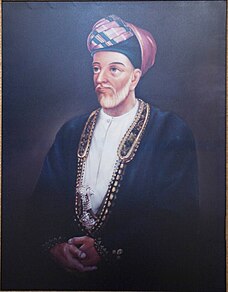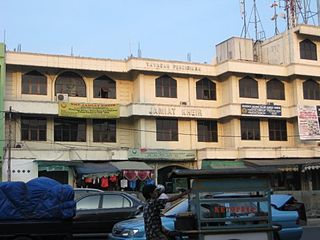Zayd ibn 'Alī was the grandson of Husayn ibn Ali, and great-grandson of Ali. Zayd was born in Medina in 695. He was the son of Ali ibn Husayn Zayn al-Abidin. Ibn Qutaybah in his book "al-Ma'ārif", republished in 1934 in Egypt, writes that one of the wives of the 4th Shia Imam was from Sindh and that she was the mother of Zayd ibn Ali. A similar claim has also been made in the book "Zayd Shaheed" by Abd al-Razzaq al-Hasani, published in Najaf. Zayd ibn Ali's mother Jodha, known by Muslim chroniclers as Jayda al-Sindhi.

Sayyid (Arabic: سيد [ˈsæj.jɪd], Persian: [sejˈjed]; meaning "Mister"; plural: Saadat or Sadat Arabic: سادة sādah is an honorific title denoting people accepted as descendants of the Islamic prophet Muhammad and his cousin Imam Ali through his grandsons, Imam Hasan ibn Ali and Imam Husayn ibn Ali, sons of Muhammad's daughter Fatimah and son-in-law Ali.

Sayyid Majid bin Said Al-Busaidi was the first Sultan of Zanzibar. He ruled Zanzibar from October 19, 1856 to October 7, 1870.

Said bin Sultan Al-Said was Sultan of Muscat and Oman from 1806 to 4 June 1856.

Sayyid Faisal bin Turki, GCIE, historic spelling Fessul bin Turkee, ruled as Sultan of Muscat and Oman from 4 June 1888 to 4 October 1913. He succeeded his father Turki bin Said as Sultan. Upon his death in 1913, he was succeeded by his eldest son Taimur bin Faisal.
Imam Sayyid Abd Allah ibn Alawi al-Haddad born in 1634 CE. He lived his entire life in the town of Tarim in Yemen’s Valley of Hadramawt and died there in 1720 CE. In Islamic history, he was considered one of the great Sufi sages. He was an adherent to the Ashari Sunni Creed of Faith (Aqeedah), while in Islamic jurisprudence (Fiqh), he was a Shafi'i.
Sultan Thuwaini bin Said al-Said (1821–1866) also called Tueni, Sultan of Muscat and Oman, was the third son of Said bin Sultan, Sultan of Muscat and Oman. Thuwaini was born in Oman, and never visited Zanzibar. When his father was away in Zanzibar, Thuwaini was his representative in Oman.

Tarim is a historic town situated in the Hadhramaut Valley of South Yemen, in the southern part of the Arabian Peninsula. Tarim is widely acknowledged as the theological, juridical, and academic center of the Hadhramaut Valley. An important focus of Islamic learning, it is estimated to contain the highest concentration of descendants of the Islamic prophet Muhammad (sayyids) anywhere in the world. The city is distinguished for producing numerous Islamic scholars, including Imam al-Haddad. Additionally, Tarim is also home to Dar al-Mustafa, a well-known educational institute for the study of traditional Islamic Sciences.
Ahmad al-Muhajir also known as Al-Imām Aḥmad bin ʻIsa was an Imam Mujtahid and the progenitor of Ba 'Alawi sada group which is instrumental in spreading Islam to India, Southeast Asia and Africa. He was the son of ‘Isa the son Muhammad the son of 'Ali al-Uraidhi who was the fourth son of Imam Ja'far as-Sadiq, a fifth generation descendant of Ali bin Abu Talib and Fatimah bint Muhammad, the daughter of Muhammad.
Sultan Sālim bin Thuwainī Āl Saʿīd was the Sultan of Muscat and Oman from 11 February 1866 – October 1868. He was the eldest son of Sultan Thuwaini bin Said and his wife Sayyida Ghaliya bint Salim Al-Busaidiyah, and acceded to the throne in succession to his father. Lewis Pelly and Henry Bartle Frere were deeply disappointed by the death of Sultan Thuwaini bin Said in their hopes for a military action against the Wahhabis, and were well aware of Salim's opposing views and refusal to join the ensuing war. Hence the British Political Resident General in the Gulf at Bushehr, Colonel Lewis Pelly, fiercely opposed the recognition of Salim whom he feared was to stop foreign interference and forge a peace deal with the Wahhabis.

The House of Al SaidArabic pronunciation: [æl Busaidi] Alternatives: or (Al-Busaidi) is the ruling Royal House of the Sultanate of Oman, and former ruling Royal House of The Sultanate of Muscat and Zanzibar and The Sultanate of Zanzibar.

The Ba 'Alawi sadah or Sadah Ba 'Alawi are a group of Hadhrami Sayyid families and social group originating in Hadhramaut in the southwest corner of the Arabian Peninsula. They trace their lineage to Sayyid al-Imam Ahmad al-Muhajir bin Isa ar-Rumi born in 873 (260H), who emigrated from Basra to Hadhramaut in 931 (320H) to avoid sectarian violence, including the invasion of the Qaramite forces into the Abbasid Caliphate.
Musa al Mubaraqqa was the son of ninth Twelver Shia Imam Mohammad al-Taqi al Jawwad and the younger brother of tenth Shiite Imam Ali al-Hadi. He is known to be the ancestor of those Sayyids who use the title of his grandfather and eight Shiite Imam Ali al-Reza or al-Rida as their surnames. All Rizvi, Ridawi and Razavi Sayyids are from the descendants of Musa al Mubarraqa. Most of them were found in Sabzevar, Iran earlier before their migration to Indian Subcontinent. There are still few villages and towns in India who trace their lineage to Musa al Mubarraqa through his son Shahzada Ahmad bin Musa, few prominent towns in India with majority population of Rizvi Sayyids is in Zaidpur district Barabanki, Machchli Gaon district Ambedkar nagar, Karari, Wasa Dargah and Hallaur in state of Uttar Pradesh India. Musa al Mubarraqa was one of the pious and gentle of personalities of his time. He had the honor to be from the direct Descendants of Prophet Mohammad.
Habib Swalehd or Salih bin Alawi Jamal al-Layl (1853-1936) was an Islamic scholar who resided in Lamu, Kenya.

Azmatkhan al-Husayni, also spelled Azmat Khan, al-Azhamatkhan or al-Azhamat Chan are a family originating in Hadhramaut. They trace their lineage to Sayyid Abd al-Malik Azmatkhan ibn Alawi Ammul Faqih, a descendant of Husayn ibn Ali. Sayyid Abd al-Malik emigrated from Hadhramaut to India in 14th century AD, earlier than other emigrations from Hadhramaut.

Jamiat Kheir is one of a few early private institutions in Indonesia that is engaged in education, and is instrumental in the history of Indonesian struggle against Dutch colonialism, preceding Sarekat Islam and Budi Utomo. It is headquartered in Tanah Abang, Central Jakarta.

Habib Alwi bin Thahir al-Haddad was an Islamic scholar known as the Mufti of Johor in twentieth century and also the co-founder of Jamiat Kheir and Al-Rabithah al-Alawiyyah foundations in Batavia during colonial Dutch East Indies.











